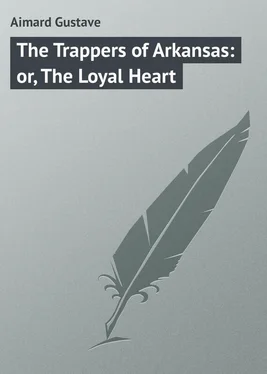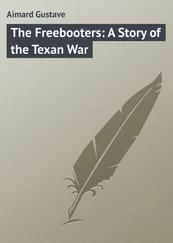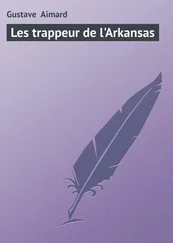Gustave Aimard - The Trappers of Arkansas - or, The Loyal Heart
Здесь есть возможность читать онлайн «Gustave Aimard - The Trappers of Arkansas - or, The Loyal Heart» — ознакомительный отрывок электронной книги совершенно бесплатно, а после прочтения отрывка купить полную версию. В некоторых случаях можно слушать аудио, скачать через торрент в формате fb2 и присутствует краткое содержание. Жанр: foreign_prose, foreign_adventure, на английском языке. Описание произведения, (предисловие) а так же отзывы посетителей доступны на портале библиотеки ЛибКат.
- Название:The Trappers of Arkansas: or, The Loyal Heart
- Автор:
- Жанр:
- Год:неизвестен
- ISBN:нет данных
- Рейтинг книги:3 / 5. Голосов: 1
-
Избранное:Добавить в избранное
- Отзывы:
-
Ваша оценка:
- 60
- 1
- 2
- 3
- 4
- 5
The Trappers of Arkansas: or, The Loyal Heart: краткое содержание, описание и аннотация
Предлагаем к чтению аннотацию, описание, краткое содержание или предисловие (зависит от того, что написал сам автор книги «The Trappers of Arkansas: or, The Loyal Heart»). Если вы не нашли необходимую информацию о книге — напишите в комментариях, мы постараемся отыскать её.
The Trappers of Arkansas: or, The Loyal Heart — читать онлайн ознакомительный отрывок
Ниже представлен текст книги, разбитый по страницам. Система сохранения места последней прочитанной страницы, позволяет с удобством читать онлайн бесплатно книгу «The Trappers of Arkansas: or, The Loyal Heart», без необходимости каждый раз заново искать на чём Вы остановились. Поставьте закладку, и сможете в любой момент перейти на страницу, на которой закончили чтение.
Интервал:
Закладка:
The whole night passed away without bringing the least satisfactory result.
At daybreak, the horse of Doña Jesuita was found half devoured in the desert. Its trappings were wanting.
The ground round the carcass of the horse appeared to have been the scene of a desperate conflict of some kind.
Don Ramón, in despair, gave orders for return.
"Great Heaven!" he cried, as he re-entered the hacienda, "is it possible that my chastisement has already commenced?"
Weeks, months, years passed away, without any circumstance, lifting the corner of the mysterious veil which enveloped these sinister events, and, notwithstanding the most active and persevering researches, nothing could be learnt of the fate of Rafaël, his mother, and Nô Eusebio.
PART I.
THE LOYAL HEART
CHAPTER I.
THE PRAIRIE
To the westward of the United States extends, many hundred miles beyond the Mississippi, an immense territory, unknown up to this day, composed of uncultivated lands, on which stands neither the log house of the white man nor the hatto of the Indian.
This vast desert, intersected by dark forests, with mysterious paths traced by the steps of wild beasts, and by verdant prairies with high and tufted herbage that undulates with the slightest breeze, is watered by powerful streams, of which the principal are the great Canadian river, the Arkansas, and the Red River.
Over these plains, endowed with so rich a vegetation, wander innumerable troops of wild horses, buffaloes, elks, bighorns, and those thousands of animals which the civilization of the other parts of America is every day driving back, and which regain their primitive liberty in these regions.
On this account, the most powerful Indian tribes have established their hunting grounds in this country.
The Delawares, the Creeks, and the Osages, prowl along the frontiers of the desert up to the environs of the establishments of the Americans, with whom some few bonds of civilization are beginning to unite them, engaged in constant conflict with the hordes of Pawnees, Blackfeet, Assiniboins, and Comanches, indomitable races, nomads of the prairies, or inhabitants of the mountains, who permeate in all directions this desert, the proprietorship of which none of them venture to assert, but which they appear to agree to devastate, uniting in vast numbers for hunting parties, as if for the purpose of making war.
In fact, the enemies travellers are exposed to encounter in these deserts are of all kinds; without mentioning in this place wild beasts, there are hunters, trappers, and partisans, who are not less formidable to the Indians than to their fellow countrymen.
The prairie, therefore, the sinister theatre of incessant and terrible contests, is nothing in reality but a vast charnel house, in which perish obscurely, every year, in a merciless war of ambuscades, tens of thousands of intrepid men.
Nothing can be more grand or more majestic than the aspect of these prairies, into which Providence has bounteously bestowed such innumerable riches, – nothing, more seductive than these green fields, these thick forests, these large rivers; the melancholy murmur of the waters rippling over the stones of the shallow stream, the songs of thousands of birds concealed under the foliage, the bounding of animals sporting amidst the high grass: everything enchants, everything attracts, and draws aside the fascinated traveller, who soon, the victim of his enthusiasm, will fall into one of those numberless snares laid under his feet among the flowers, and will pay with his life for his imprudent credulity.
Towards the end of the year 1837, in the latter days of the month of September, by the Indians called the moon of the falling leaves – a man, still young, and who, from his complexion, notwithstanding his costume was entirely like that of the Indians, it was easy to perceive was a white man, was seated, about an hour before sunset, near a fire, the want of which began to be felt at this period of the year, at one of the most unfrequented spots of the prairie we have just described.
This man was at most thirty-five to thirty-six years old, though a few deeply marked wrinkles on his broad white forehead seemed to indicate a more advanced age.
His features were handsome and noble, and impressed with that pride and energy which a savage life imparts. His black eyes, starting from his head, and crowned with thick eye-brows, had a mild and melancholy expression, that tempered their brilliancy and vivacity; the lower part of his face disappeared beneath a long, thick beard, the bluish tint of which contrasted with the peculiar paleness spread over his countenance.
He was tall, slender, and perfectly well proportioned; his nervous limbs, upon which rose muscles of extreme rigidity, proved that he was endowed with more than common strength. In short, the whole of his person inspired that respectful sympathy which superior natures attract more easily in these countries than in ours, where physical strength is nearly always the attribute of the brute.
His remarkably simple attire was composed of a mitasse, or a kind of close drawers falling down to his ankles, and fastened to his hips by a leather belt, and of a cotton hunting shirt, embroidered with ornaments in wool of different colours, which descended to his midleg. This blouse, open in front, left exposed his embrowned chest, upon which hung a scapulary of velvet, from a slight steel chain. Short boots of untanned deerskin protected him from the bites of reptiles, and rose to his knees. A cap made of the skin of a beaver, whose tail hung down behind, covered his head, while long and luxuriant curls of black hair, which were beginning to be threaded with white, fell beneath it over his broad shoulder. This man was a hunter.
A magnificent rifle laid within reach of his hand, the game bag which was hung to his shoulder belt and the two buffalo horns, suspended at his girdle, and filled with powder and balls, left no doubt in this respect. Two long double pistols were carelessly thrown near his rifle.
The hunter, armed with that long knife called a machete, or a short-bladed straight sabre, which the inhabitants of the prairies never lay aside, was occupied in conscientiously skinning a beaver, whilst carefully watching the haunch of a deer which was roasting at the fire, suspended by a string, and listening to the slightest noises that arose in the prairies.
The spot where this man was seated was admirably chosen for a halt of a few hours.
It was a clearing at the summit of a moderately elevated hill, which, from its position, commanded the prairie for a great distance, and prevented a surprise. A spring bubbled up at a few paces from the place where the hunter had established his bivouac, and descended, forming a capricious cascade; to the plain. The high and abundant grass afforded an excellent pasto for two superb horses, with wild and sparkling eyes, which, safely tethered, were enjoying their food at a short distance from him. The fire, lighted with dry wood, and sheltered on three sides by the rock, only allowed a thin column of smoke to escape, scarcely perceptible at ten paces' distance, and a screen of all trees concealed the encampment from the indiscreet looks of those persons who were probably in ambuscade in the neighbourhood.
In short, all precautions necessary for the safety of the hunter had been taken with that prudence which announces a profound knowledge of the life of a wood ranger.
The red fires of the setting sun tinged with beautiful reflections the tops of the great trees, and the sun itself was on the point of disappearing behind the mountains which bounded the horizon, when the horses, suddenly ceasing their repast, raised their heads and prickled their ears – signs of restlessness which did not escape the hunter.
Читать дальшеИнтервал:
Закладка:
Похожие книги на «The Trappers of Arkansas: or, The Loyal Heart»
Представляем Вашему вниманию похожие книги на «The Trappers of Arkansas: or, The Loyal Heart» списком для выбора. Мы отобрали схожую по названию и смыслу литературу в надежде предоставить читателям больше вариантов отыскать новые, интересные, ещё непрочитанные произведения.
Обсуждение, отзывы о книге «The Trappers of Arkansas: or, The Loyal Heart» и просто собственные мнения читателей. Оставьте ваши комментарии, напишите, что Вы думаете о произведении, его смысле или главных героях. Укажите что конкретно понравилось, а что нет, и почему Вы так считаете.












